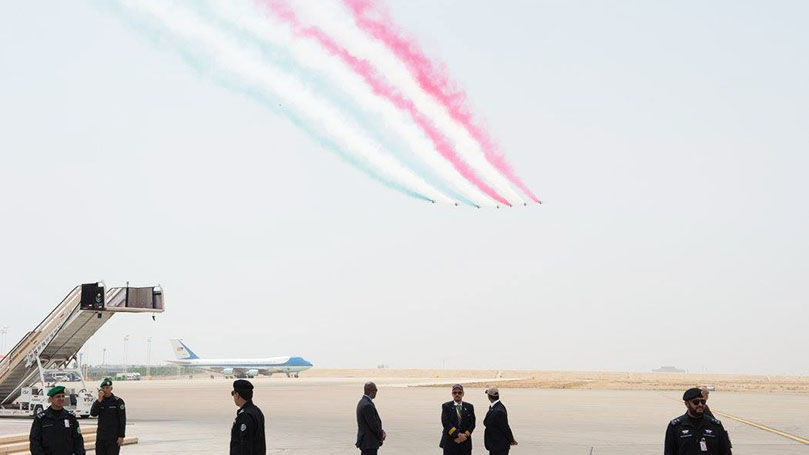
President Trump has embarked on a week-long overseas trip, which began with a visit to Riyadh, Saudi Arabia on Saturday May 20, and will end with his participation in a meeting with the G-7 nations in Sicily on May 27. He has taken with him his wife, Melania, daughter Ivaka, Secretary of State Rex Tillerson Secretary of Commerce Wilbur Ross and other officials. From what we have seen and heard so far, this excursion is not a harbinger of good for working people either in the United States or in the countries he is visiting, or anywhere
During the 2016 election campaign and in the first three and a half months of his presidency, Trump made clear that he will run a foreign policy subservient to the interests of finance capital, oil and other extractive industries, and the military – industrial complex. His cabinet appointments and other executive actions strongly bear this out so far. He has also continued the belligerent ultra-nationalistic “America First” rhetoric which has unnerved so many people around the world, while allowing him to pose, for domestic consumption as a “great American patriot”, and while trying – with mixed success—to sweep his and his family’s sleazy national international business dealings out of sight. His rhetoric about, and actions toward, Muslims in the United States and elsewhere were topped off in early April by an armed intervention in Syria.
During the weekend, Trump was in Saudi Arabia for meetings with King Salman and other members of the Saudi royal family and government, and subsequently with Saudi Arabia’s close allies in the Gulf Cooperation Council. Trump a $110 billion arms deal with Saudi Arabia. He also spoke against terrorism, but made it clear that he aligns the United States with the Saudis and the Gulf Arab states against Iran, which he depicts as the main enemy of all and the chief source of violence in the region, ignoring the fact that ISIS and Al Qaeda get their funding and fighters entirely from the Sunni community and that they, like some of the Sunni despots Trump met with, are violently intolerant of the Shia community. He said not a word about lack of democracy and human rights among U.S. allies in the area. Nor did he mention the bloody violence and starvation conditions in Yemen, where a coalition led by Saudi Arabia and supported by the United States has been carrying out a campaign of bombing which has led to a humanitarian crisis of shocking proportions. In these circumstances, the U.S. arms deal with Saudi Arabia can be seen as being a major factor in fueling violence in the Middle East.
Then it was on to Israel, where Trump was met by protests in his visits to Tel Aviv and Jerusalem on Monday. Trump brought smiles to the face of Israeli Prime Minister Binyamin Netenyahu who had a somewhat tense relationship with former U.S. president Obama. Trump kindly offered himself as an honest broker between Israel and the Palestinians, while hinting at an alliance among the United States, Israel and Saudi Arabia against Iran. There and at his next stop, in Bethlehem on the West Bank where he met with Palestinian leaders (and was also the target of demonstrations), he managed not to mention the idea of a two state solution, the main goal of the Palestinians. Nor did he mention the thousand Palestinian prisoners on a hunger strike against the horrible conditions to which the Israeli government has subjected them.
Next he is off to Europe, where he is likely to push U.S. corporate trade interests, plus the strengthening of NATO’s armed forces. He will get a courteous reception from conservative European leaders, but perhaps Pope Frances, with whom he is also meeting, will speak to him in a different tone.
Because he has not immediately implemented his entire reactionary foreign policy, some pundits have fooled themselves into thinking that the Trump administration is moderating its essential nature. This is a dangerous illusion. The overwhelming influence of finance capital, big oil and the military industrial complex is the guiding force in the Trump administration, and represents the danger of fascism and war that Georgi Dimitroff warned about in the 1930s. And we know what that led to.
To prevent that from happening again, there needs to be a vastly increased awareness and mobilization at the grassroots in this country, against imperial interventions and war. The cpusa pledges itself to work to realize this consciousness and mobilization.


 Join Now
Join Now